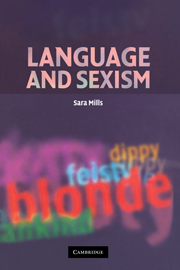Summary
In this chapter, I analyse the way that the highly contested terms ‘politically correct’, ‘political correctness’ (‘PC’) and ‘political incorrectness’ have developed, and I situate the usage of these terms within a broader strategy of responding to feminist, disability rights and race-awareness campaigns around language reform through ridicule and humour. To clarify, in its general usage, ‘political correctness’ is characterised as an excessive attention to the sensibilities of those who are seen as different from the norm (women, lesbians, gays, disabled people, black people). This attitude is crystallised in a set of media-invented apocryphal terms (such as ‘vertically challenged’ instead of ‘short’; ‘follically challenged’ instead of ‘bald’; ‘personhole cover’ instead of ‘manhole/inspection cover’; ‘coffee with milk’ rather than ‘black coffee’) which no anti-sexist or anti-racist campaigners have argued should be adopted. These invented terms are often listed alongside some of the terms which feminist campaigners have argued should be adopted (such as ‘Ms’ instead of ‘Miss or Mrs’ and ‘chairperson’ instead of ‘chairman’). This mixing of ‘real’ and invented examples of proposed reforms, together with the use of the term ‘PC’ in contexts where it is uniformly negatively evaluated, has led to a genuine confusion amongst the general population about what ‘PC’ actually is.
The term ‘political correctness’ seems to have changed its meaning, as I show later in this chapter, from a knowingly ironic usage in leftist political circles to its current usage as a term of abuse largely by those on the right.
- Type
- Chapter
- Information
- Language and Sexism , pp. 100 - 123Publisher: Cambridge University PressPrint publication year: 2008



